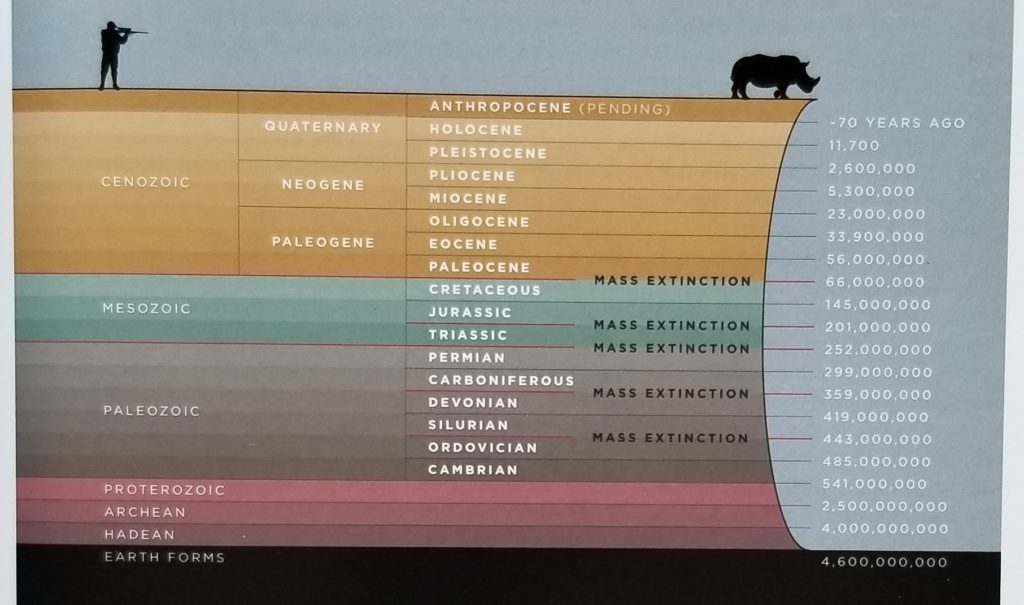My wife Pam and i recently visited the Art Gallery of Ontario to take in the Anthropocene exhibit. Anthropocene is the name proposed for the geological epoch in which we are now living, and though it has not yet been officially adopted by the international commission which has the power to do so, it’s becoming a household word. I’ve posted about it twice in the past year (you can use the search box on this blog to find those posts), but words can’t evoke the feeling of the Anthropocene as powerfully as the images in the exhibit and the feature film bearing the name. In this post i’ll focus on the name.

The graphic above, taken from the book published by the AGO to document the exhibit, shows the Anthropocene as the epoch following the Holocene. But some sources use it as another name for the Holocene, or a subdivision of it. This makes a kind of sense because the Holocene is defined as beginning about 11,700 years ago, with the retreat of the glaciers from the last ice age, which was also around the time when humanity began to make its mark on the biosphere, especially with the new technology called agriculture. But why was this most recent geological epoch called the Holocene? It’s hard to see anything “holistic” about it, with all these humans messing up the planet.
According to Wikipedia, ‘the name Holocene comes from the Ancient Greek words ὅλος (holos, whole or entire) and καινός (kainos, new), meaning “entirely recent.”’ So the concept of “wholeness” is applied here adverbially, to modify the ‘-cene’ suffix which (with its Latinized Greek root) is etymologically related to recent. The habit of adding that suffix to the names of ‘recent’ geological periods was introduced by Sir Charles Lyell, who called the preceding epoch the Pleistocene, from the Greek superlative pleistos meaning ‘most.’ But when you have an epoch named ‘most recent,’ how do you name one that is even more recent? Lyell’s choice was Holocene, or ‘entirely recent.’
That pretty well exhausts the possibilities for naming a new geological period according to how recent it is. Anthropocene (‘humanly recent’?) is more informative than Holocene because it names the current epoch after its most remarkable characteristic: the collective impact of humans on their home planet. The idea is that geologists (of whatever species) studying the rock strata of the Earth hundreds of thousands of years hence will find a layer full of ‘technofossils’ and other traces of the human rearrangements of nature we are now making.
But there is another side to this ‘human epoch’: the same technology that is causing mass extinction of other species is giving us more, and more useful, information about our planet, its history, and its predictable future than we’ve ever had. With this predictability comes a new sense of responsibility. Now that we are aware of the unintended consequences of our past actions, it’s our global mission to revise our intentions and observe more carefully what happens when we try to carry them out. This is the only way we can harmonize and integrate anthropomorphic systems with the more inclusive natural systems of the planet.
The challenge is not so much technological as political, even spiritual. For instance, we have the technology to halt or possibly even reverse anthropogenic climate change, but so far lack the global common sense to make it a priority. It seems we’d rather put our energy into petty squabbles and paranoid schemes, judging from the leaders we’ve following lately. But if we could overcome this tendency and unify human practices for the common good of all life on Earth, maybe the Holocene could turn more holistic after all.
Speaking of the common, there is another Greek root Latinized as -cen- which is highly relevant in the Anthropocene. This one is derived not from καινός (“new”) but from κοινός (“common”). It’s the root idea of Cenoscopy, which bases itself on experiences common to all, and is closely allied to what Peirce called ‘critical common-sensism.’ Common sense in our time sees that philosophy, and even religion, ought to be working hand in hand with globally-based sciences such as ecology and climate science. Ironically, it’s the so-called “populist” politicians of our time, with their hate speech and antiscientific disinformation, who are working against the common sense that could save us from ourselves.
Thanks for this intriguing post. I’ve replied to it here: http://blog.uvm.edu/aivakhiv/2018/11/07/koinocene-or-coenocene/
Best,
Adrian